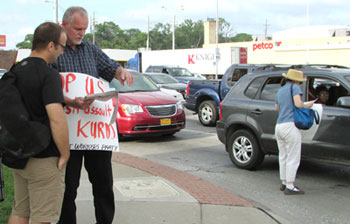

Vol. 79/No. 30 August 24, 2015

|
| Militant/Jacquie Henderson |
| During action called by Socialist Workers Party in Omaha, Nebraska, Aug. 6, protesters distribute fliers opposing attacks on Kurds. Dennis Richter, SWP state chairperson, discusses issue with Chad Cupit, who works nearby at University of Nebraska. |
Dozens of people stopping at the corner in their cars took copies of a statement by Dennis Richter, chairperson of the SWP in Nebraska. Chad Cupit, a research worker at nearby University of Nebraska, was one of the pedestrians who stopped to talk.
“The Kurds are an oppressed nationality of 30 million living in Iran, Iraq, Turkey and Syria,” Richter told him. “They have stepped forward to take on the Islamic State and to advance their struggle for a Kurdish homeland. But Washington and other imperialist powers, fearing the dynamic toward Kurdish sovereignty, have relentlessly opposed Kurdish independence and want to reimpose a centralized Iraqi government with powers over the Kurds’ autonomous region.”
Cupit didn’t know a lot about the recent events, but said that he opposed the assault on the Kurds. He was one of several people who got a copy of the Militant to find out more.
The protest was organized by the Kurdish Cultural Centre and most participants were Kurds. Many indicated support for the Kurdistan Workers Party (PKK), which has been the main target of the Turkish attacks.
Nishtman Osman spoke proudly about the women who “carry the same weight as the men,” fighting with the Kurdish People’s Protection Units (YPG) in Syria against Islamic State.
Jack Fallon, a journalist who was in Kobani, Syria, in June told participants that by the time Islamic State was driven out, the city was almost destroyed. Rebuilding it involves not just Kurds, but many others from across Syria and Turkey.
“We must also protest the U.S. and U.K. governments’ role,” Pete Clifford from the Communist League said. “They are complicit with Erdogan’s attacks. The U.K. rulers were responsible after World War I for denying the Kurds a homeland. Today they are driven by the same concerns: stability for their class interests.”
“Kurdistan was divided into four pieces,” Baran said. “We have been fighting this injustice for the last 100 years. But even though there has been a lot of suffering we have had success because we never gave up.” He denounced the two weeks of intense bombing by the Turkish government against Kurdish fighters.
Also speaking was freelance photojournalist Elizabeth Chappell, who recently returned from Kobani. She has been visiting Turkey for 17 years and has been won to support the Kurdish struggle for independence, seeing firsthand the discrimination the Kurds faced from the Turkish government. “The Kurds are a very strong and proud people,” she said. “They need to become independent.”
“The Socialist Workers Party supports the Kurdish fight for a homeland,” Sam Manuel said. “We demand an end to the attacks on the Kurdish people and pledge to bring their struggle to working people in this city and throughout Georgia.”
In closing remarks, Baran said that before the recent advances, “90 percent of people in the world didn’t know we exist and now 90 percent know who we are and we have won their respect. We want to continue to get the word out.”
A handful of people stopped to talk and pick up fliers. A worker on his break from a nearby office explained that he is from Iran and has many friends who are Kurdish. He took a photo of the protest to send to his friends.
Related articles:
Backed by US, Turkish gov’t expands war on Kurds
Front page (for this issue) |
Home |
Text-version home